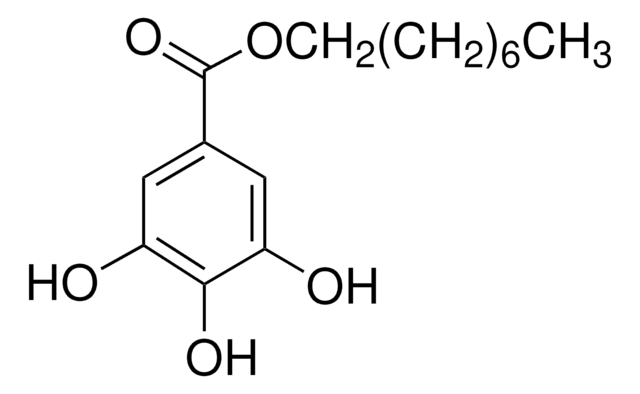PHR1118
Propyl gallate
Pharmaceutical Secondary Standard; Certified Reference Material
Synonym(s):
PG, 3,4,5-Trihydroxybenzoic acid propyl ester
About This Item
Recommended Products
grade
certified reference material
pharmaceutical secondary standard
Quality Level
Agency
traceable to Ph. Eur. P3640000
traceable to USP 1576800
API family
propyl gallate
CofA
current certificate can be downloaded
technique(s)
HPLC: suitable
gas chromatography (GC): suitable
mp
146-149 °C (lit.)
application(s)
cleaning products
cosmetics
flavors and fragrances
food and beverages
personal care
pharmaceutical (small molecule)
format
neat
storage temp.
2-30°C
SMILES string
CCCOC(=O)c1cc(O)c(O)c(O)c1
InChI
1S/C10H12O5/c1-2-3-15-10(14)6-4-7(11)9(13)8(12)5-6/h4-5,11-13H,2-3H2,1H3
InChI key
ZTHYODDOHIVTJV-UHFFFAOYSA-N
Looking for similar products? Visit Product Comparison Guide
General description
Propyl gallate is a synthetic phenolic antioxidant (SPA) utilized in food additives to inhibit or regulate the lipid oxidation. SPAs are cost-effective, largely available and highly efficient in comparison to their natural counterparts.
Application
Reconstitution
Analysis Note
Other Notes
Footnote
related product
Signal Word
Danger
Hazard Statements
Precautionary Statements
Hazard Classifications
Acute Tox. 4 Oral - Aquatic Acute 1 - Aquatic Chronic 1 - Eye Dam. 1 - Skin Sens. 1
Storage Class Code
13 - Non Combustible Solids
WGK
WGK 2
Flash Point(F)
368.6 °F - closed cup
Flash Point(C)
187 °C - closed cup
Choose from one of the most recent versions:
Certificates of Analysis (COA)
It looks like we've run into a problem, but you can still download Certificates of Analysis from our Documents section.
If you need assistance, please contact Customer Support.
Already Own This Product?
Find documentation for the products that you have recently purchased in the Document Library.
Customers Also Viewed
Our team of scientists has experience in all areas of research including Life Science, Material Science, Chemical Synthesis, Chromatography, Analytical and many others.
Contact Technical Service














